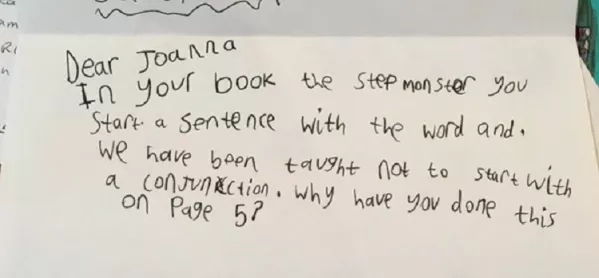Joanna Nadin is a children’s author who has published more than 50 books. She writes speeches. She goes into schools and talks to children about writing.
But she has also committed, in the eyes of the national curriculum, an unforgivable sin: she has started a sentence with a conjunction.
In case she was unaware of her crime against all that is grammatically correct in the world, one of her primary-aged readers has written a letter to advise her of it.
“Dear Joanna,” the letter states. “In your book The Stepmonster you start a sentence with the word and. We have been taught not to start with a conjunction. Why have you done this on page 5?”
“Part of me loved it,” Ms Nadin tells TES. “The pedant that I was and am has learnt the rules of grammar, and has to enforce them from time to time.
“But this is no longer a rule anywhere but in schools. There’s no reason not to start a sentence with a conjunction.
“I’m in no way having a go at the teachers who have to teach this. It’s the absurdity of it being on the national curriculum.”
Ms Nadin is the author of the Rachel Riley series of novels - “Every single book has sentences beginning with ‘and’ in them,” she says - as well as a number of books for schools. But she also regularly visits primary schools, to speak to pupils.
“At primary school, they have this thing called ‘wow words’,” she says. “Instead of saying something’s ‘big’, you say it’s ‘gargantuan’. Instead of saying something’s ‘good’, you say it’s ‘magnificent’.
“Obviously, there are times when this is appropriate. And there are times when it makes your writing read like it’s been fed through a thesaurus machine.
“I spend all my time taking wow words out of students’ writing, because they’re ugly most of the time. It’s a focus on the rules, rather than on the story.”
She quietly hopes that her pedantic correspondent was encouraged to write the letter by her teacher, “so that the writer would come back and say, ‘No - you can do what you like’.”
And she does indeed plan to write back, taking time and effort to craft a suitable response: “I’m going to endeavour to start every sentence with a conjunction.”




